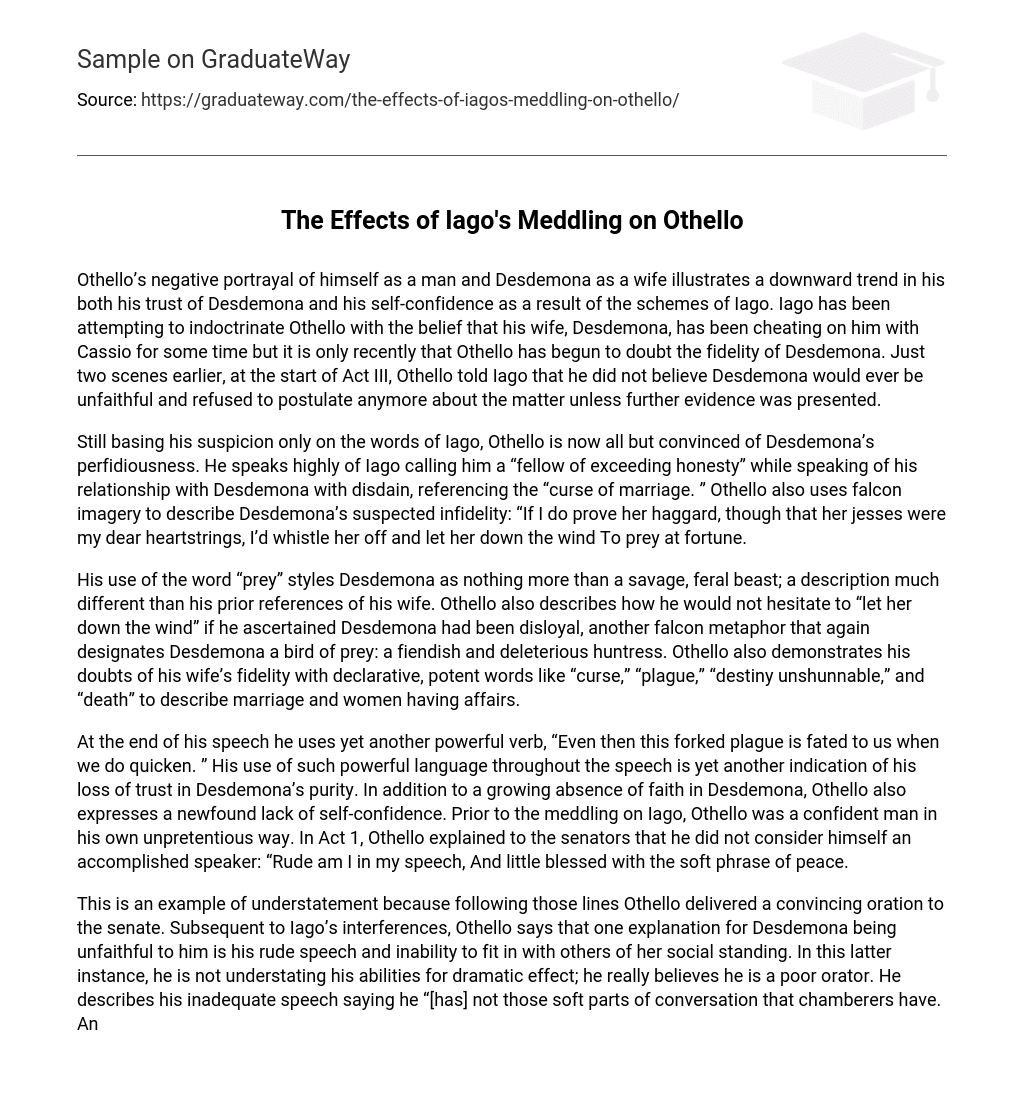Iago has successfully eroded Othello’s trust in Desdemona and shattered his self-confidence through manipulations. By planting doubts about Desdemona’s fidelity, Iago is convincing Othello that she is having an affair with Cassio. As a result, Othello’s faith in his wife has been shaken and he now questions her loyalty. In a previous instance, Othello had complete confidence in Desdemona’s commitment and refused to entertain suspicions without proof. However, his viewpoint has now shifted.
Still, Othello’s suspicion of Desdemona’s faithfulness is now almost certain, solely based on Iago’s words. Despite his disdain for his relationship with Desdemona and referring to it as the “curse of marriage,” Othello speaks highly of Iago, considering him a “fellow of exceeding honesty.” In describing Desdemona’s alleged infidelity, Othello uses falcon imagery, stating that even if she were proven to be unfaithful, he would release her and let her pursue her own fortune.
The usage of the term “prey” in describing Desdemona portrays her as a ferocious, untamed animal, which is a strikingly different depiction from Othello’s previous descriptions of his wife. Othello further uses a falcon metaphor, referring to how he would not hesitate to discard Desdemona if he discovered her disloyalty, once again characterizing her as a predatory bird: a malicious and destructive huntress. Additionally, Othello expresses his suspicions about his wife’s faithfulness through forceful and definitive words such as “curse,” “plague,” “destiny unshunnable,” and “death” when discussing marriage and women involved in extramarital affairs.
At the end of his speech, he employs another strong verb to convey his viewpoint: “Even then this forked plague is fated to us when we do quicken.” This usage of potent language throughout the speech serves to indicate his diminishing confidence in Desdemona’s purity. Alongside his fading trust in Desdemona, Othello also showcases a newfound lack of self-assurance. Prior to Iago’s interference, Othello was a self-assured individual in his own modest manner. In Act 1, Othello conveyed to the senators that he did not perceive himself as a skilled orator: “Rude am I in my speech, And little blessed with the soft phrase of peace.”
This text exemplifies understatement as Othello delivers a compelling speech to the senate. However, due to Iago’s manipulations, Othello suggests that Desdemona’s infidelity could be attributed to his impolite language and inability to fit in with her social circle. In this case, Othello genuinely believes he is a subpar orator and is not exaggerating for dramatic effect. He describes his speech as lacking the finesse and charm that others possess. Furthermore, Othello expresses low confidence by lamenting his old age, stating that he has declined into the twilight years. Previously, Othello’s age has been portrayed as a source of wisdom; however, after Iago plants doubt about Desdemona’s loyalty, Othello views himself as inferior. He even attributes his skin color as a possible reason for Desdemona’s dissatisfaction. Othello also utilizes animal metaphors to depict himself.
Due to Desdemona’s infidelity, Othello believes himself to be lower than a toad. He expresses this by saying, “I would rather be a toad and live in a dungeon than have a place in the heart of the one I love but shared with others.” This speech highlights the impact Iago’s manipulation has had on Othello’s trust in his wife and his own self-confidence. It also foretells a tragic end to Othello and Desdemona’s marriage, as he proclaims that he would prefer to be imprisoned like a toad rather than continue the relationship.





